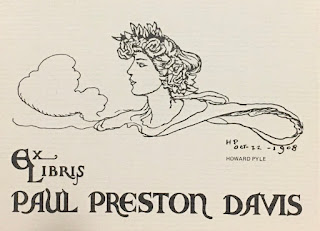I’d felt Preston’s loss since May 2020, in fact, when he called to tell me he was terminally ill. I meant to write him soon after, but I couldn’t find the words, and the next time we spoke - for over two hours, all about the weathervane on Pyle’s studio - he sounded so “normal” that I foolishly thought he’d gotten better, somehow.
In one of my old journals there’s an entry about a visit I made with my mother to Wilmington thirty years ago today, on February 15, 1992:
Saturday was grey and the Book Fair at the DuPont Country Club was not abundant, but I was successful in that I met Paul Preston Davis who told me to come over after the show - so Mom and I did follow him home through the rain and stayed 3 hours, me talking nonstop and poring over his dogeared but massive Pyle collection. It was a wonderful thing, as he is a man after my own heart and mind when it comes to Pyle. It was overwhelming, amazing, dizzying, and I left grinning.I also left with a big box of Preston’s duplicates and a promise to pay him back at some point. But after receiving a portrait of Pyle I’d painted as a thank you, he forgave the debt. (That’s also when he inadvertently became a completist collector of my work - whether he really wanted to or not.)
Around the same time Preston and I met, we both realized that, despite being longtime collectors of Pyle’s work, we knew comparatively little about Pyle’s life. So we set about tracking down information in earnest: he in the Greater Wilmington area; me in and around New York and writing - longhand - to libraries across the country that might hold even just one Pyle letter. There was much more out there than we’d expected, and every few weeks we’d debrief each other and exchange copies of what we’d turned up. The tiniest factoid often led us to whole new areas of research which spurred us to ferret out still more and more.
Of course, all that ferreting applied to our respective Pyle collections, too, so our friendship sometimes had - for me, at least - a competitive, covetous edge to it. Preston was a quiet, methodical, doggedly determined collector of the “Hoovering” school - sucking up anything and everything - and he had the advantage of living in “Pyle Country” and having myriad local connections. It was maddening. I still kick myself over things I “lost” to him: Pepper and Salt in a dust jacket! That photo of Pyle with a full head of hair! Yet he never crowed over his acquisitions and was always congratulatory when I found something special or interesting. Eventually - mercifully - we reached a point of “Well, if I can’t have it, at least it found a home with you.”
Over the years I must have logged more telephone time with Preston than anyone else in my life, including my own family: I was always happy to talk about new leads, new finds, new treasures, or to pick up threads of years-old conversations. And when he asked for help on his huge Pyle bibliography, I gladly spent several four- and five-day stretches holed up in his library, collating, cross-referencing, and double-checking details. During other visits we ventured outside: digging at the Delaware Archives and the Delaware Art Museum, and driving in around Wilmington and Chadds Ford, in search of remnants, ruins, or at least locations of Pyle’s haunts and homes. Those long, meditative hours with him are among my favorite memories.
And yet, for all our time together - on the phone, in letters, or in person - Preston and I rarely spoke of things other than Pyle, and I’m embarrassed to admit that I knew little about the rest of his life, except for snippets picked up here and there. But the pursuit of all things Pyle has always been a respite from the outside world for me, and I think it was for Preston, too.
I still can’t find all the words to say how important he was to my life - and to Howard Pyle’s memory - but maybe these will do for now.
**********
More about Paul Preston Davis’s Pyle collection - which now resides at the Brandywine River Museum - can be found here. And this video highlights his collection of Delawareana, now at the Delaware Historical Society.






